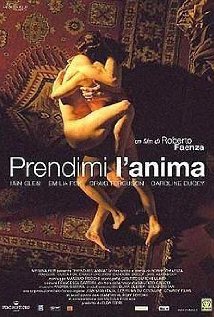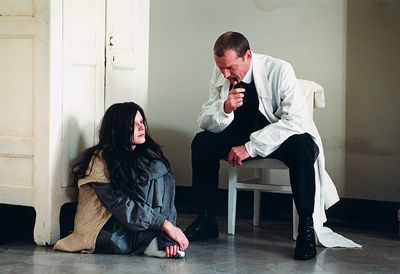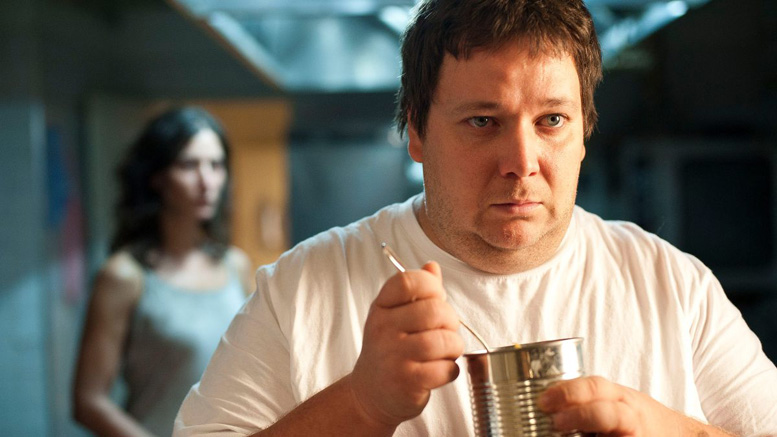
2003
Aka Prendimi l’anima, L’âme en jeu
90 mins
Italy / France / UK
A Jean Vigo Italia, Les Films du centaure, Cowboy Film production in association with Medusa Film and Leandro Burgay editrore
Distriobuted by Medusa Distribuzione
Italian release date: 17-01-2003
Director: Roberto Faenza
Story: Roberto Faenza
Screenplay: Giampiero Rigosi, Elda Ferri, Alessandro Defilippi, Gianni Arduini, Roberto Faenza, Hugh Fleetwood
Cinematography: Maurizio Calvesi
Music: Andrea Guerra
Editor: Massimo Fiocchi
Art director: Giantito Burchiellaro
Cast: Iain Glen (Jung), Emilia Fox (Sabina Spielrein), Craig Ferguson (Fraser), Caroline Ducey (Marie), Jane Alexander (Emma Jung), Michele Melega (Pawel), Daria Galluccio (Renate), Joanna David (Sabina’s mother)
Torinese director Roberto Faenza has been around a few years now. Starting off with a couple of psychedelic, controversial productions in the late sixties, Escalation (68) and H2S (69), he’s probably best known for Copkiller (83), featuring, weirdly, Harvey Kietel and Johnny Lydon (then riding on the success of his post-Sex Pistols career). Since the mid-nineties, he’s been surprisingly active, shooting a film every couple of years and picking up a handful of awards (most particularly for Look to the Sky, his 93 film starring Jean-Hugues Anglade). Although his work has lost some of its cult appeal as it has become mature, it’s always interesting, well made and highly professional. The closest comparison I can think of is with Pupi Avati, another filmmaker who has strong local ties and is respected, but not necessarily well known overseas.
Like many of his films, The Soul Keeper is strongly written and features an interesting, capable cast. It revolves around twin narrative strands, both of which feed into one another. In the first, Carolini Ducey plays Marie Franquin, an attractive academic who becomes fascinated by the case of Sabina Spielrein, a young Russian woman who, suffering from hysteria, was treated by Carl Jung, featured in his writings and then, seemingly, disappeared. In order to discover more about Sabina’s life, she travels to Moscow, where she joins forces with Fraser (Craig Ferguson), a Scottish historian who becomes interested in her research.
Intertwined with this, we discover more about the story of Sabina (Emilia Fox) and Jung (Iain Glen). His first patient after branching out from his mentor, Sigmund Freud, she had been admitted to his care after several unsuccessful attempts at treatment elsewhere. Initially prone to wild mood swings and self-harm, his sympathetic approach slowly leads to an improvement, and eventually she’s well enough to leave the hospital and take up the study of psychiatry herself. The two of them begin a passionate affair which is, of course, doomed, not least because Jung (Iain Glenn) is already married and has a small child. When he tries to break off the relationship, she doesn’t take it at all well and – pausing only to have a minor breakdown, qualify as a fully fledged doctor, get married and have children – returns to Moscow, where she sets up ‘The White Nursery’, an experimental institution for disturbed children. Russia, though, is in the grip of the Communism, and psychiatry isn’t something that Stalin is particularly keen on.

This is a stately, rather understated production, which you can imagine going down well on the festival circuit. The story itself is unquestionably fascinating. Sabina Spielrein was a figure who had been rather forgotten by history until a series of letters between her, Jung and Freud were discovered and published by Aldo Carotenuto, one of Italy’s foremost Jungian psychologists. Seeing as hers was a passionate story involving key cultural figures and important historical events, it’s not hard to see why it appealed to Faenza. The only problem is that he doesn’t quite manage to do it justice: with a bit more budget behind it and more epic ambitions, this could have been a big winner, along the lines of The English Patient.
As it is, it’s well made and interesting, but you don’t get entirely caught up in the drama. Several key sections are skimmed over: the background to Sabina’s illness is never examined, and the final 30 minutes, which covers her life back in Moscow, feels rather rushed (which, considering it includes her setting up her hospital, falling foul of Stalin’s purges and then, as a Russian Jew, being executed during a Nazi massacre, contains more than enough subject matter to make up a film in itself). Certain characters are sketchy, not least Emma Jung, who might as well not have featured and, frankly speaking, the film as a whole wouldn’t have been harmed if the modern day sequences had been dropped and the historical story had been given a bit more time to develop instead.
It’s still a good film, well worth a look, it’s just you can’t help but feel it could have been something more. Emilia Fox does a decent job in a difficult role, she also appeared in The Pianist the same year, so obviously had a thing for rather heavy international productions at the time and Iain Glen, who also has a thing for interesting film choices, appeared in Faenza’s more recent The Case of Unfaithful Klara (2009). Lower down in the cast are a couple of familiar faces: Giovanni Lombardo Radice, of Cannibal Ferox and City of the Living Dead, appears briefly, and Emma Jung is played by Jane Alexander – no, not that Jane Alexander – an English ex-pat who made her name hosting game shows on Italian television and has also appeared in the likes of Buck and the Magic Bracelet (99) and Tornatore’s The Star Maker (95).


nice review for THE SOUL KEEPER –a film not known here in Turkey.
THANKS